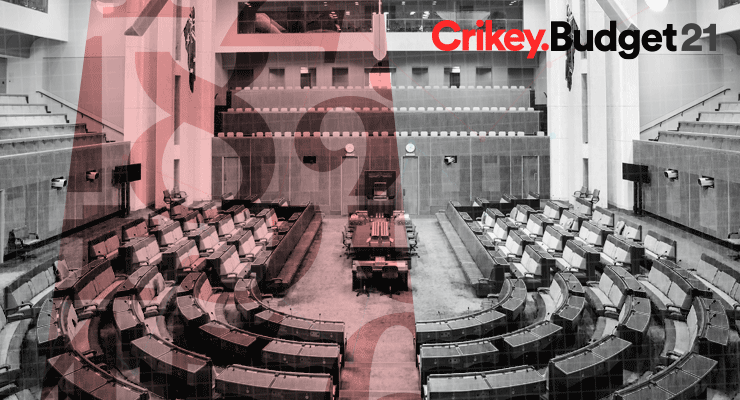
The trouble with leaking everything in the budget beforehand is that it’s such an anti-climax on the day. Not to mention how to keep up the excitement until the next election — whenever that may be.
It’s all very well to make it look like an attractive no-real-bad-news-buried-in-it election budget, but how will that work later in the year or even early next year when we’ve already forgotten most of what they leaked last weekend?
It will be a challenge even for Scotty from Marketing and the millions in taxpayer funded advertisements he will inevitably authorise prior to then.
A taste of that was given in the sales pitch, featuring some downright fantasies, in today’s budget papers.
Sure, a better-than-expected deficit is a huge selling point these days, and there is the $15 billion on asphalt proj- sorry, infrastructure. But what about what people traditionally vote on: the old hip pocket nerve?
Start with the obvious election pitch: personal income tax cuts. They are touted as being worth $8 billion and allegedly boosting GDP by $4.5 billion and adding 20,000 jobs in the next financial year.
This was achieved by simply extending the current low- and middle-income tax offset which was originally due to end this financial year.
Makes the tax “cut” look a little more precarious going forward. Even Treasurer Josh Frydenberg admitted in his lockup press conference this was only a temporary “stimulus” measure.
No pre-election budget would be worth its spin without a nod to the small business sector, and it looks like just that.
Much fanfare was given to the announcement of the extension (there’s that word again) of the Full Expensing and Temporary Loss Carry Back provisions.
The “temporary” Full Expensing pitch is wearing a bit thin given it has been extended for so many years. Same reaction from most businesses according to accountants.
This didn’t stop the government making the fantastical projection that, combined, the extension of these two measures “is estimated to deliver a further $20.7 billion in tax relief to businesses over the forward estimates”.
One should not be churlish, as there were some much-needed small business sectors that were singled out for help.
Medical and bio-tech companies will get a special “Patent Box”, which is a cute term for simply giving them a lower corporate tax rate.
(While we’re on bizarre titles, there’s $387 million for the Square Kilometre Array, a program to find aliens… er, rather, to “revolutionise our understanding of the universe”.)
While there is virtually nothing new for the struggling arts sector the digital games industry is to get $18 million.
Then there’s my personal favourite: relief for distillers and brewers with an excise refund scheme cap increase from $100,000 to $350,000.
“This will further grow Australia’s alcohol manufacturing sector,” the press release proclaims.
Now you’re talking — though it’s still a long way from the old “beer, ciggie prices down” pre-election budget front pages.








Hi Janine, just by the way, you missed the chance to notice that among the many surprisingly anti-liberal party concepts in this budget, the mob have actually agreed to put $387 million towards basic science – at the same time as they have been trying to strangle universities to death. The money is Australia’s part of the world’s largest science project, the Square Kilometre Array. This is a giant radio telescope consisting of an array of radio antennas – guess what – a square kilometre in size, spread out over a vast area partly in the deserts of Western Australia and partly in South Africa. This project is already indirectly employing over 200 scientists in Perth, and as construction gets going it will employ people of many different trades, mostly in Western Australia. It’s actually an investment in basic science, not aliens, and it quite easy to understand for people with some basic scientific knowledge. Hit us up for more information why don’t ya?
Ian, you’re going to have egg on your face when the SKA does find aliens.
Basic research…. it will almost certainly find something we’re not looking for